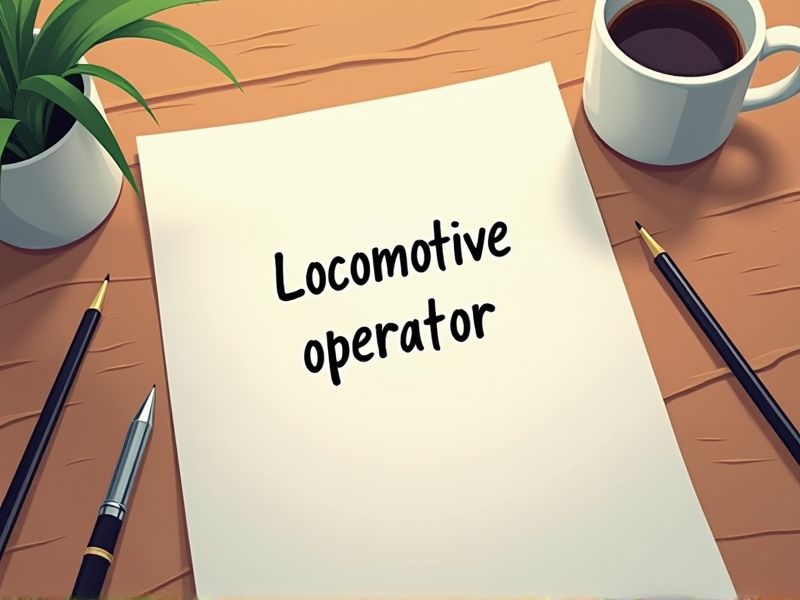
Locomotive operators are tasked with the critical responsibility of safely transporting passengers and freight, hence the need for specific certifications. These certifications ensure operators have an in-depth understanding of railway systems and the skills required to handle complex machinery. Furthermore, mandatory certifications help in maintaining industry safety standards, thereby reducing the risks associated with rail operations. Important certifications for locomotive operators may include those in railway operations, safety regulations, and mechanical proficiency.
FRA Locomotive Engineer Certification
The FRA Locomotive Engineer Certification ensures that locomotive operators meet standardized qualifications, enhancing safety across rail networks. Rigorous certification requirements reduce accident risks associated with human error. Certified engineers demonstrate proficiency in handling complex equipment, which is critical for efficient rail operations. Regulatory compliance through certification supports consistent oversight and accountability within the rail industry.
FRA Qualification and Skills Test Certification
FRA Qualification and Skills Test Certification ensures locomotive operators meet federally mandated safety standards. This certification verifies operators possess essential skills like braking and signaling, ensuring safe train operation. FRA requirements help prevent accidents by enforcing consistent, high-level training across the industry. Certification compliance minimizes operational risks and enhances public trust in rail transport systems.
Railroad Operating Rules Certification
Railroad Operating Rules Certification ensures locomotive operators possess the necessary knowledge to safely navigate and control trains. This certification process minimizes accidents and enhances overall operational security by ensuring adherence to standardized protocols. Training and assessment tied to the certification help in identifying potential skill gaps, reducing human error factors. Regulatory bodies see certified operators as compliant, ultimately leading to increased trust from stakeholders and the public.
Positive Train Control (PTC) Certification
Positive Train Control (PTC) Certification is needed for locomotive operators to enhance rail safety by preventing collisions and derailments. By mandating PTC, operators can significantly reduce the risks of human error, which often leads to accidents. Certification ensures operators are familiar with the complex technology that automatically controls train movements. With PTC systems in place, operators can improve overall efficiency and reliability of rail services.
Advanced Signal and Communication Systems Certification
Advanced Signal and Communication Systems Certification is essential for locomotive operators due to the increasing complexity of rail technology, which demands enhanced proficiency in handling sophisticated communication equipment. The certification ensures operators are well-versed in modern signal systems, which is critical for maintaining safety and reducing the risk of accidents on the tracks. With rail networks becoming more integrated and expansive, certified operators are equipped to manage efficient traffic flow and coordination, optimizing overall system performance. As rail infrastructure evolves with technology upgrades, operators with this certification can more effectively adopt and implement new communication protocols.
Hazardous Materials (HAZMAT) Endorsement Certification
Locomotive operators require a HAZMAT Endorsement Certification due to strict federal regulations governing the transportation of hazardous materials. The certification ensures operators are knowledgeable about handling, safety, and emergency procedures specific to hazardous cargo. Without this endorsement, the risk of accidents and environmental contamination can increase significantly. Certification also aligns with industry standards to prevent potential legal and financial liabilities for employers.
OSHA Workplace Safety Certification
OSHA Workplace Safety Certification is crucial for locomotive operators as it helps reduce the risk of accidents by promoting a culture of safety-first awareness. Compliance with certified safety practices can lead to fewer operational disruptions, ensuring reliable train schedules and minimizing costs. Proper certification also equips operators with the knowledge to handle emergency situations effectively, protecting both personnel and equipment. Employers benefit from this certification as it often results in lower insurance premiums due to recognized safety standards.
Emergency Response and Evacuation Certification
Emergency Response and Evacuation Certification equips locomotive operators with the necessary skills to handle crises, minimizing potential harm during train incidents. The certification ensures operators can quickly and effectively respond to emergencies such as derailments or onboard fires. Without proper training, operators may struggle to make critical decisions under pressure, increasing the risk of injury or fatalities. Compliance with safety regulations and maintaining public trust hinge on operators being prepared for unforeseen emergencies.
CPR and First Aid Certification
Locomotive operators often work in isolated areas, where immediate access to medical professionals might be limited, making CPR and First Aid skills crucial for emergency situations. Train collisions or derailments can result in injuries, and operators with certification are better equipped to stabilize conditions until further help arrives. Regulatory bodies may mandate such certifications for operators to enhance overall passenger and crew safety. Operators with these skills contribute positively to workplace safety culture, reassuring passengers and colleagues alike.
Rail Yard Operations Certification
The Rail Yard Operations Certification ensures that locomotive operators understand safety protocols and operational procedures, reducing the likelihood of accidents. It provides operators with a comprehensive knowledge of advanced locomotive technologies and navigation systems. By certifying personnel, rail companies ensure regulatory compliance, minimizing legal and operational risks. Certification elevates the overall competency standard within the industry, promoting efficient and reliable rail yard operations.
Summary
With locomotives operator certifications, you enhance operational skills and safety awareness. Certified operators often achieve higher efficiency in railway operations due to a formal understanding of protocols. The certification can lead to increased job opportunities and career advancement possibilities within the industry. Companies tend to observe reduced accidents and improved reliability with certified operators.
